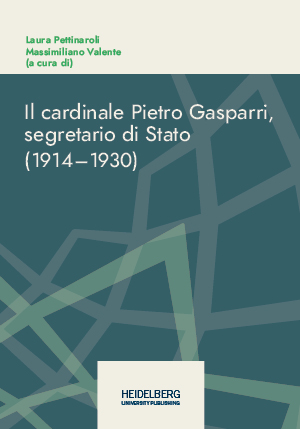Zitationsvorschlag
Lizenz (Kapitel)

Dieses Werk steht unter der Lizenz Creative Commons Namensnennung - Weitergabe unter gleichen Bedingungen 4.0 International.
Identifier (Buch)
Veröffentlicht
Gasparri e l’azione umanitaria della Santa Sede durante la Grande Guerra
Abstract: Benedict XV was the great promoter of the humanitarian action that the Holy See developed during the First World War. The cardinal secretary of state, Pietro Gasparri, fully identified with the Pope in this field. From the Secretariat of State, Gasparri promoted the diplomatic work in countries with pontifical representations as well as in those where no nuncio were accreditated so as to effectively carry out the humanitarian objectives. These included the exchange of seriously injured prisoners, the hospitalization in neutral countries of the slightly injured, the release of prisoners of war, parents of numerous families and those who had been in captivity for more than 18 months. The diplomatic work of the Holy See during the war was enormous, demanding in its goals and often criticized in the warmongering environment at the time, since the Holy See was accused by all belligerent powers of favouring the enemy. Gasparri was able to support the pontifical representatives in face of repeated obstacles interposed by the governments of the belligerent countries, manifesting a firm and broad-minded personality. The Holy See was backed by the International Committee of the Red Cross to achieve these ends. The cardinal secretary of state did not hesitate to congratulate the Protestant members of the Committee for their charitable work, which was not usual then in the interconfessional relationships between Christian denominations.






